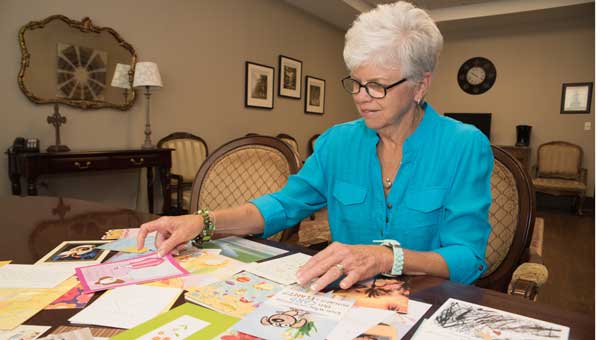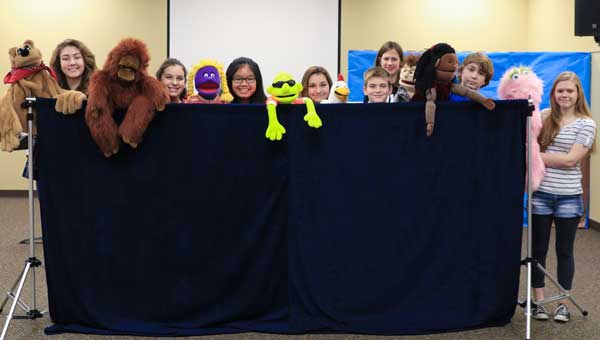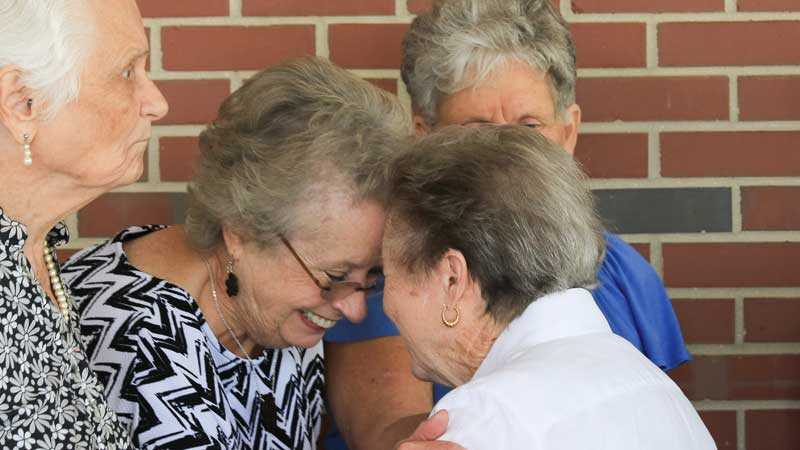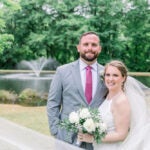
Shivers looks through her collection of more than 50 support cards that she received after her surgery from family and friends.
Survivor uses experience to help others fighting breast cancer
Written by Emily Sparacino
Photo by Keith McCoy
Betty Shivers is many things: a wife, a mother, a grandmother, a retired high school math teacher, a tennis player, a cook, a sewer, a tutor.
“I stay very, very busy,” Shivers said.
The 66-year-old plays tennis in three different leagues, enjoys biking and being outdoors and loves her 5-year-old granddaughter as only a devoted grandmother can.
Shivers exudes optimism, a trait she said has carried her through difficult times, including the months following her breast cancer diagnosis about six years ago.
Shivers can add “survivor” to her list of life roles, and now, she belongs to a growing group of people who volunteer to help breast cancer patients, survivors and co-survivors through Forge Breast Cancer Survivor Center.
Prior to her involvement with Forge starting about four months ago, however, Shivers organized a local support group at her church, Prince of Peace Catholic Church in Hoover, with friend and fellow cancer survivor Bette Graffeo, who was diagnosed nearly a month after Shivers.
“We walked our journey, and once we got to a point where we were better, we met and said, ‘Let’s see if we can’t start a group,'” Shivers said.
The group meets once a month at the church.
“We have had speakers, but our primary purpose is to address any needs of any of the members that are going through their journey.”
With Shivers’ connection to Forge and Graffeo’s involvement with the Susan G. Komen organization, the group at Prince of Peace has the resources needed in making a difference for people affected by cancer, while maintaining a smaller, intimate environment at the monthly meetings.
Currently, Shivers is a mentor with Forge, which means she communicates with people via handwritten cards, telephone calls, emails and texts, serving as a liaison between patients and other entities. She listens, encourages and offers support, and when she can’t personally help a mentee with a specific problem, Shivers refers her to someone who can help.
“It’s a good fit,” she said of the role, adding, “I have a huge mailing group list where I send a daily reflection every morning. It can be silly and serious and scriptural based. I feel that’s a big part of what I’m called to do to help – to try to help somebody feel a little better for the day.”
Shivers said she knows the value of a solid network of people committed to lifting up a cancer patient in times of fear, pain and grief.
In the summer of 2010, at 60 years old, Shivers received the news she had ductal carcinoma in situ (DCIS), the most common type of non-invasive breast cancer that hasn’t spread to surrounding tissue.
“I was really lucky,” she said. “It was only on my right side, but with my surgeon’s recommendations and my feeling … I elected to have a double mastectomy.”
Although she didn’t have to have chemotherapy radiation, Shivers was hospitalized again after her surgery when she developed a large infection.
“That was probably the harder part of the whole thing,” she said. “I didn’t realize how sick I was. Once we got through that hurdle, I was good to go.”
Shivers described the moments after she absorbed the news of her diagnosis as “very shocking.”
“It was tough,” she said. “I thought, you know, I’m going to be OK. I have support, I have strong faith, I’ve got great doctors. I told my friends, I said, ‘Hey, this is just a bump in the road. I’m going to get through it.'”
About 10 days after the phone call, Shivers had her surgery at Brookwood.
In a span of four or five months, she received more than 50 cards in the mail from friends expressing well wishes and encouragement.
She even received a visit from two friends, a husband and wife, who dressed in cheerleading outfits and performed cheers they wrote for Shivers.
“That meant the world to me,” Shivers said. “It was just hilarious. Couldn’t have been better.”
Now, Shivers is in a position to return the favor.
Making connections with other women and providing the with support they need are rewarding to Shivers.
“It couldn’t be more rewarding to see someone say, ‘Thank you so much for reaching out to me,'” she said.
In addition to breast cancer patient and survivor services, Forge offers co-survivors – family members or caregivers of patients and survivors – support in the form of counseling and other outlets.
“Forge can help some of these co-survivors that have a whole different set of issues,” Shivers said. “To me, that’s taking it a whole other step than just taking care of the patient.”
Forge volunteers differ in age and backgrounds, but all are focused on one purpose: supporting other women in similar circumstances, and helping them “to realize that normalcy really can be restored.”
And more volunteers are needed, as are prayers and awareness, according to Shivers.
“We’re very excited about this new center being a part of our community,” Shivers said. “I just think it’s going to help many, many, many people.”










